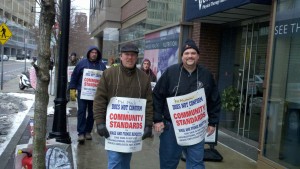Journalists Tell Emerson College Students About Health Communications Careers
With the job market looking up for 2012 grads–especially in health care and communications fields, according to the National Association of Colleges and Employers and Reuters– I was very pleased to join Stephen Smith of the Boston Globe and Lara Salahi of ABC News in speaking to Emerson College students about careers in health communications.
Our panel, on April 5 was one in a series comprising Emerson’s “Communications Week.” It was moderated by Bridgette Collado, who teaches at Emerson.
Stephen Smith, now the Globe’s City Editor, traced his career as a health reporter from his early days at the Miami Herald through his many years at the Globe--describing a drive to tell the stories of individuals in order to bring their plight to public attention. He pointed out that while in Massachusetts, most people have access to health care, in other parts of the US, this is not the case. He also described his coverage of the 2010 earthquake in Haiti, focusing on the story of Reginette Cineliene , a 14-year old girl who lost her father, a sister, her home and a leg, spent a year living in a tent encampment, was often hungry, yet still managed to study with the goal of one day becoming a doctor. Smith said he found Reginette inspirational–and that he was pleased that his reporting had led readers to provide Reginette’s remaining family with money to rent a home and pay for an artificial limb.
Lara Salahi, an ABC News health producer, emphasized the importance of telling the stories of “real” people-as opposed to focusing on reports by experts. She used three brief slide/video shows to illustrate the hope and difficulties autism brings to families. One featured a young man who had wanted to be a doctor but, instead, went into radiation diagnostics; a second a husband and wife who are raising three autistic daughters; and the third parents of an autistic son who died young of a seizure disorder.
Anita Harris
I described my career as somewhat unusual–mainly driven by the vagaries of the economy. I became a journalist by starting a newspaper with college friends; worked in print, radio and television in New York City, taught college, and went into public affairs when my college downsized. I emphasized that with economic and technologic changes, versatility is key; it’s important to have skills in all media, enjoy change, and if you’re going to do work independently you have to like to market yourself.
I also outlined the broad changes I’ve noticed. When I started out in, print and broadcast journalism operated in separate silos and major news organizations had tremendous power to control and shape the information reaching the public. Today, increasingly, we are experiencing a convergence of media, in which news organizations are employing multiple media to reach their readers–and no longer monopolize the flow of information. The results are both positive and negative.
Convergence of media
For example, the Globe, previously print only, now has online version that includes video reports. Reporters for public radio are asked to blog and carry cameras; many reporters and editors are using social media–all of which have the potential to inform the public in a variety of ways. However, with staff cutbacks, many journalists are working harder now than in the past; I’m concerned that covering stories in multiple media could diminish the number and depth of stories on which they report.
Dissipation of control
I think it’s great that anyone with access to a computer can provide information to the world. But without vetting by bona fide, trained journalists, this democratization makes it difficult to know where information is coming from, how good it is, and, to play on words, where the truth lies– presenting special difficulties for health communicators.
—-Anita M. Harris
Anita Harris is a writer and content strategist in Cambridge, MA.
New Cambridge Observer is a publication of the Harris Communications Group of Cambridge, MA.
 I’m pleased to learn that CCTV and Google will be offering one-on-one computer training for Cambridge, MA residents over 50. Participants, paired with Google employees. will receive one-on-one training on how to send email, search the Internet, pay bills on-line, and more. Training will be tailored to each participant’s interests and experience. People of all levels are welcome to register.
I’m pleased to learn that CCTV and Google will be offering one-on-one computer training for Cambridge, MA residents over 50. Participants, paired with Google employees. will receive one-on-one training on how to send email, search the Internet, pay bills on-line, and more. Training will be tailored to each participant’s interests and experience. People of all levels are welcome to register. Local AFL-CIO Insulators, Tin Kinockers and Pipefitters from Cambridge Local use a large inflatable rat to make clear how they feel about the use of non-union, non-Cambridge workers by PH Mechanical for work currently underway at 302 Third Street in Kendall Square. “They don’t conform to community standards; they are unlicensed, and they have no apprentice program,” said one union member who declined to give his name. He said he expects that Cambridge City Council will be discussing the issue at its next meeting, possibly this evening.
Local AFL-CIO Insulators, Tin Kinockers and Pipefitters from Cambridge Local use a large inflatable rat to make clear how they feel about the use of non-union, non-Cambridge workers by PH Mechanical for work currently underway at 302 Third Street in Kendall Square. “They don’t conform to community standards; they are unlicensed, and they have no apprentice program,” said one union member who declined to give his name. He said he expects that Cambridge City Council will be discussing the issue at its next meeting, possibly this evening. Photos C. Anita M. HarrisInsulators, Tin Knocker, & Pipefitters Local AFL-CIO unions protest use of non-union workers at 302 3rd St.
Photos C. Anita M. HarrisInsulators, Tin Knocker, & Pipefitters Local AFL-CIO unions protest use of non-union workers at 302 3rd St.